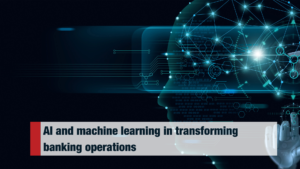
When referring to the Banking and Finance Industry, we all can agree that this sector is constantly seeking ways to improve efficiency, reduce costs, and enhance the customer experience. Robotic Process Automation (RPA) has already significantly impacted banking processes by automating routine tasks and freeing employees to focus on more value-adding activities. However, with the integration of Artificial Intelligence (AI) and Machine Learning (ML), the capabilities of RPA in the Banking and Finance Industry are set to expand even further.
Suppose you are still wondering why automation software and AI have become essential for banks and financial companies. In that case, our team of tech specialists from Connections Consult compiled a list of the latest AI and machine learning trends and what banks have to do to keep up with the forever-changing marketplace.
Why are RPA and Artificial Intelligence (AI) important for banks?
Over 40% of all labor-intensive tasks in the world economy might be mechanized with the help of modern technology, according to McKinsey research. The banking sector, in particular, is expected to be one of the two industries spending the most on Artificial Intelligence solutions by 2024, according to IDC.
Financial services businesses can go from automating single operations to end-to-end processes by integrating automation solutions, like RPA, with AI technologies, such as machine learning, NLP, OCR, or computer vision.
The term “intelligent automation,” “cognitive automation,” or “hyperautomation” are often used to describe this combination. Various application cases and case studies of intelligent automation in the financial services sector will be examined in this study. One example of how a software robot may be programmed is to open an ERP system, access a particular transaction, and automatically extract the necessary data fields onto an Excel spreadsheet.
The use of robotics
Artificial Intelligence and Machine Learning can bring new levels of intelligence and decision-making to RPA in the banking industry. For example, AI and ML can be used to automate complex processes such as fraud detection, customer service, and credit scoring. AI-powered RPA robots can analyze large amounts of data, identify patterns, and make decisions based on that data, without the need for human intervention.
In the area of customer service, AI-powered RPA robots can handle customer queries and complaints, providing quick and accurate responses. Consequently, the customer experience will improve, and employees will be motivated to focus on more complex tasks. AI and ML can also be used to automate the process of credit scoring, enabling banks to quickly assess the creditworthiness of potential borrowers. This can lead to faster loan approvals and a more efficient loan processing process.
Intelligent automation’s compliance use case aims to ensure that employees adhere to organizational regulations and procedures. Correct adherence to these regulations reduces the possibility of outsiders bringing legal action on the grounds that their rights were infringed upon or their property was harmed due to carelessness by employees engaged in work-related activities within a company’s premises. Enforcing rules automatically without the need for human intervention at every stage saves time, money, and resources while ensuring that everything is carried out in accordance with the rules established by regulatory agencies.
In conclusion, integrating AI and ML with RPA in the banking industry can revolutionize banks’ operations. AI and ML can bring new levels of intelligence and decision-making to RPA, enabling banks to automate complex processes, improve efficiency, and enhance the customer experience. As AI and ML continue to evolve, the role of RPA in the banking industry will continue to expand and play a critical role in shaping the future of banking.
Interested in exploring your automation opportunities? Book a 30-minute no-obligation discovery session with us, and let’s find the right solution for your business.
